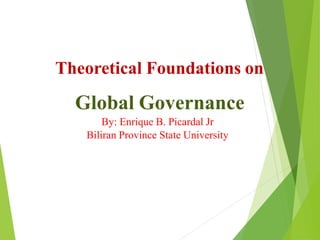
Theoretical foundations of global governance
- 1. Theoretical Foundations on Global Governance By: Enrique B. Picardal Jr Biliran Province State University
- 2. What is theory? Why we need to study theory? Introduction
- 3. 1. Basic Ideas Human nature is basically good Injustice, aggression and war are products of inadequate or corrupt social institutions These can be eliminated through collective or multilateral actions and institutional building. The expansion of human freedom is a core liberal belief that can be achieved through democracy and market capitalism. I. Liberalism
- 4. 2. Roots of Liberalism I. Liberalism Hugo Grotius (1583-1645): Father of international law Enlightenment: Individuals are rational human beings and have capacity to improve their condition by creating a just society. Immanuel Kant (1724-1804): perpetual peace among democracy states
- 5. 2. Roots of Liberalism Adam Smith: free trade could create interdependencies Woodrow Wilson: collective security, international institution. I. Liberalism Woodrow Wilson, 28th President of the US (1913-1921)
- 6. 3. Sociological Liberalism I. Liberalism IR is not only about states and states relations, but about transnational relations (pluralism). Karl Deutsch: Interconnecting activities helps create common values and identities among people from different state and paves the way for peace. James Rosenau: IR have been supplemented by relations among private individuals, groups, and society, referred to as mobius-web of global governance.
- 7. 4. Interdependence Through trade, investment, people-to- people contact, interdependence among states is increasingly high. War is more costly. Keohane & Nye: “even if … anarchy constrains the willingness of states to cooperate, states nevertheless can work together and can do, esp. with the assistance of international institutions” I. Liberalism
- 8. 5. Institutional Liberalism With a high degree of interdependence, states often set up international institutions/rules to deal with common problems. Woodrow Wilson: transformation from a jungle of chaotic power politics to a zoo of regulated and peaceful intercourse through the building of IGOs. I. Liberalism
- 9. 6. Republic Liberalism Democracies never go to war with each other due to three reasons: (1) peaceful conflict resolution (2) common moral values or ‘pacific union’ and (3) interdependence. Francis Fukuyama: “The End of History and the Last Man”- the triumph of Western democracies, which is the final form of government. I. Liberalism
- 10. 1. Basic Ideas and Assumptions Human nature: bad, selfish, power-seeking Actors: Nation-states (rational and unitary) International system: anarchic and conflictual John Mearsheimer: International cooperation is impossible due to the problems of cheating and relative gain. Thucydides: … the standard of justice… is the fact that the strong do what they have the power to do and the weak accept what they have to accept… International Law and IOs: tools to maximize interests II. Realism
- 11. Hans Morgenthau: IL and IOs are largely weak and ineffective, tool of states, and reflect the distribution of power. Main issues: national security, survival and existence, balance of power, security dilemma Future of IR: no progressive change
- 12. 2. Neo-realism/Structural Realism II. Realism Kenneth Waltz: “Theory of International Politics A basic feature of IR is the structure of anarchy. State leaders are prisoners of the structure as there is no room for foreign policymaking. All states are equal only in a formal-legal sense; they are unequal, profoundly in a substantive or material sense. To ensure peace and stability, it is needed to maintain the balance of power. Bipolar system (CW system) is more stable.
- 13. 3. Hegemonic Stability Theory II. Realism It is believed that international economic system is most likely to be open and stable when there is a single dominant or hegemonic state, which has a sufficiently large share of resources and is willing to take a leadership and provide public goods Pax Britannica during 19th century Pax Americana after the WWII Pax Sinica???
- 14. III. Marxist Theory The evolution of the production process is a basis for explaining how patterns of social relations develop between those who control the production and those who execute the tasks of production. Every society divides into two main classes: a small class of those who own the means of production and a large class with nothing. Ex. in the Capitalist system: bourgeoisie ><proletariat. So, IL and IOs are just products of a dominant group of states, dominant ideas, and the interests of the capitalist class. Dependency Theory???
- 15. Periphery
- 16. How the global governance can be seen through the lenses of the three conceptual frameworks?
- 17. Reading: Chapter 2, International Organizations: the Politics and Processes of Global Governance, page 35-59